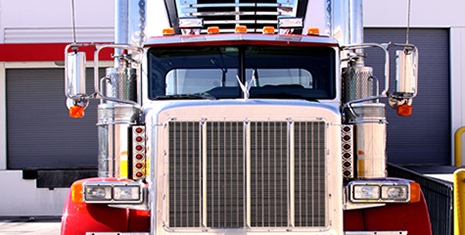
As of January 15, Canadian border authorities have been instructed to refuse access to their nation to truckers who cannot show proof of vaccination. Canadian truckers who drive into the U.S. won’t be let back into their own country without proof of vaccination either.
This is causing severe disruptions in sending products across the border. Fresh fruits and vegetables are among the items that are hardest hit.
The U.S. exported $21 billion in food products to Canada in 2020, according to Bloomberg News. The largest category was prepared food ($2.18 billion). The next largest categories were fresh vegetables ($1.89 billion) and fresh fruit ($1.58 billion).
As a result, the cost of shipping produce from California or Arizona increased by 25 percent last week, according to George Pitsikoulis, president and CEO Montreal-based distributor Canadawide Fruits BB #:117489, as quoted in Bloomberg.

“The lower the supply, the higher the price. Ultimately it’s the consumer that pays for this,” Pitsikoulis told Crain’s Business Detroit.
Bison Transport Inc., one Canada’s largest trucking firms, is expected to lose 10 percent of its shipping capacity as a result of the measure.
The bottleneck doesn’t just affect U.S. produce. A great deal of fruits and vegetables are shipped to Canada from South America via ports in the northeastern U.S.
Bloomberg quoted Larry Davidson, president of North American Produce Buyers Ltd. BB #:115772 in Toronto, who said that the weekend before the vaccine mandate took effect, his company had only one truck available to pick up 75,000 boxes of grapes in Philadelphia.
“I have heard anecdotally that truckers are looking to stop hauling perishable product as there are too many risks if they are delayed in their delivery,” said Ron Lemaire, president of the Canadian Produce Marketing Association BB #:153602, told Crain’s Detroit Business.
A strange combination of forces seems determined to impede produce shipments between the two nations. Canada, under heavy prompting from the U.S., stopped shipments of (mostly white) potatoes from Prince Edward Island to its southern neighbor for fear of the potato wart virus.
The American Trucking Association estimates that 50-60 percent of American truckers are unvaccinated.
Such is the news. I find it difficult to resist editorializing. Personally, I do not have any sympathy or respect for people who refuse to be vaccinated for the coronavirus.
If you are an unvaccinated trucker headed for Canada, you are, in my opinion, causing harm to public health and the economies of the U.S. and Canada. You are also contributing to higher food costs in Canada, where people are straining under high prices even more than Americans are.
So if you’re subjected to some inconvenience at the border, don’t come back whining.
As of January 15, Canadian border authorities have been instructed to refuse access to their nation to truckers who cannot show proof of vaccination. Canadian truckers who drive into the U.S. won’t be let back into their own country without proof of vaccination either.
This is causing severe disruptions in sending products across the border. Fresh fruits and vegetables are among the items that are hardest hit.
The U.S. exported $21 billion in food products to Canada in 2020, according to Bloomberg News. The largest category was prepared food ($2.18 billion). The next largest categories were fresh vegetables ($1.89 billion) and fresh fruit ($1.58 billion).
As a result, the cost of shipping produce from California or Arizona increased by 25 percent last week, according to George Pitsikoulis, president and CEO Montreal-based distributor Canadawide Fruits BB #:117489, as quoted in Bloomberg.

“The lower the supply, the higher the price. Ultimately it’s the consumer that pays for this,” Pitsikoulis told Crain’s Business Detroit.
Bison Transport Inc., one Canada’s largest trucking firms, is expected to lose 10 percent of its shipping capacity as a result of the measure.
The bottleneck doesn’t just affect U.S. produce. A great deal of fruits and vegetables are shipped to Canada from South America via ports in the northeastern U.S.
Bloomberg quoted Larry Davidson, president of North American Produce Buyers Ltd. BB #:115772 in Toronto, who said that the weekend before the vaccine mandate took effect, his company had only one truck available to pick up 75,000 boxes of grapes in Philadelphia.
“I have heard anecdotally that truckers are looking to stop hauling perishable product as there are too many risks if they are delayed in their delivery,” said Ron Lemaire, president of the Canadian Produce Marketing Association BB #:153602, told Crain’s Detroit Business.
A strange combination of forces seems determined to impede produce shipments between the two nations. Canada, under heavy prompting from the U.S., stopped shipments of (mostly white) potatoes from Prince Edward Island to its southern neighbor for fear of the potato wart virus.
The American Trucking Association estimates that 50-60 percent of American truckers are unvaccinated.
Such is the news. I find it difficult to resist editorializing. Personally, I do not have any sympathy or respect for people who refuse to be vaccinated for the coronavirus.
If you are an unvaccinated trucker headed for Canada, you are, in my opinion, causing harm to public health and the economies of the U.S. and Canada. You are also contributing to higher food costs in Canada, where people are straining under high prices even more than Americans are.
So if you’re subjected to some inconvenience at the border, don’t come back whining.
Richard Smoley, contributing editor for Blue Book Services, Inc., has more than 40 years of experience in magazine writing and editing, and is the former managing editor of California Farmer magazine. A graduate of Harvard and Oxford universities, he has published 12 books.




